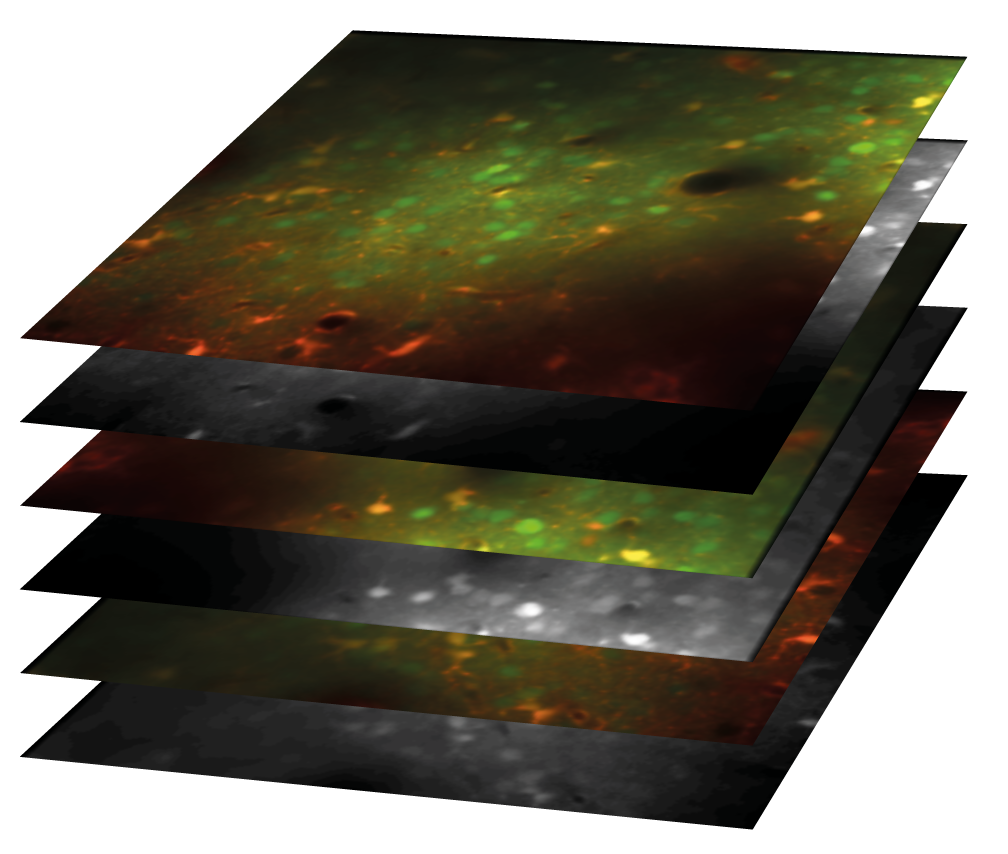Rapid reading of TIFF stacks for Matlab, with lazy loading
memmapfile for TIFF files
24th July, 2011A stack of two-photon data

A stack of two-photon data
Some two-photon imaging systems store data as three- (or more-) dimensional image stacks, stored in TIFF files. These are quite unwieldy if you need to process them in Matlab, since it is usually required that the entire stack is loaded into memory. Matlab does not offer an equivalent to memmapfile for TIFF files, so I wrote one myself.
This class allows you to access a TIFF file as a matlab tensor, while only reading the data that you need from disk. A TIFFStack object appears like a four-dimensional tensor, with dimensions for rows, columns, frames and channels (multiple samples per pixel). These objects can be passed transparently into other functions that expect matlab tensors. If you need to process only a portion, or only one channel of a TIFF stack, then this class will save you allocating the enormous amounts of memory required to load the entire file. TIFFStack is also much faster than using imread to read each frame of the TIFF file separately.
Update: 5th September, 2013
TIFFStack now attempts to use libTiff, which is directly supported in recent Matlab versions. This has provided dramatic speed-ups over the previous version, and is still a good deal faster than using imread or the Matlab Tiff class. If libTiff is not available, then Matlab-only code is used to read image data. permute, ipermute, transpose and ctranspose are now also transparently supported.
Download and install
Clone or download TIFFStack from GitHub.
Install TIFFStack by cloning or unpacking into a directory called TIFFStack. Add this directory to the Matlab path.
Usage
tsStack = TIFFStack(strFilename <, bInvert>)
A TIFFStack object behaves like a read-only memory mapped TIFF file. The entire image stack is treated as a matlab tensor. Each frame of the file must have the same dimensions. Reading the image data is optimised to the extent possible; the header information is only read once.
This class attempts to use the Matlab tifflib interface, if available. If not, it uses a modified version of tiffread [1, 2] to read data. Code is included (but disabled) to use the matlab imread function, but this function returns invalid data for some TIFF formats.
Construction of a TIFFStack object
>> tsStack = TIFFStack('test.tiff'); % Construct a TIFF stack associated with a file
>> tsStack = TIFFStack('test.tiff', true); % Indicate that the image data should be inverted
tsStack =
TIFFStack handle
Properties:
bInvert: 1
strFilename: [1x9 char]
sImageInfo: [5x1 struct]
strDataClass: 'uint16'
Accessing data
>> tsStack(:, :, 3); % Retrieve the 3rd frame of the stack, all planes >> tsStack(:, :, 1, 3); % Retrieve the 3rd plane of the 1st frame >> size(tsStack) % Find the size of the stack (rows, cols, frames, planes per pixel) ans = 128 128 5 1 >> tsStack(4); % Linear indexing is supported >> tsStack.bInvert = true; % Turn on data inversion
Publications
This work was published in Frontiers in Neuroinformatics: DR Muir and BM Kampa. 2015. FocusStack and StimServer: A new open source MATLAB toolchain for visual stimulation and analysis of two-photon calcium neuronal imaging data, Frontiers in Neuroinformatics 8 85. Please cite our publication in lieu of thanks, if you use this code.
References
[1] Francois Nedelec, Thomas Surrey and A.C. Maggs. Physical Review Letters 86: 3192-3195; 2001. DOI: 10.1103/PhysRevLett.86.3192
[2] http://www.embl.de/~nedelec/
Acknowledgements
This work uses tiffread2 from Francois Nedelec to access the data in the TIFF file. Matlab includes the ability to read TIFF files in imread, including niceties such as only reading a region of interest from each frame, but imread is incredibly slow and amazingly buggy (as of July 2011). TIFFStack uses tiffread2 in an optimised fashion, by reading and caching the header information (the image file directories — IFDs). Each frame can then be read directly without re-opening the file and re-reading the IFDs.